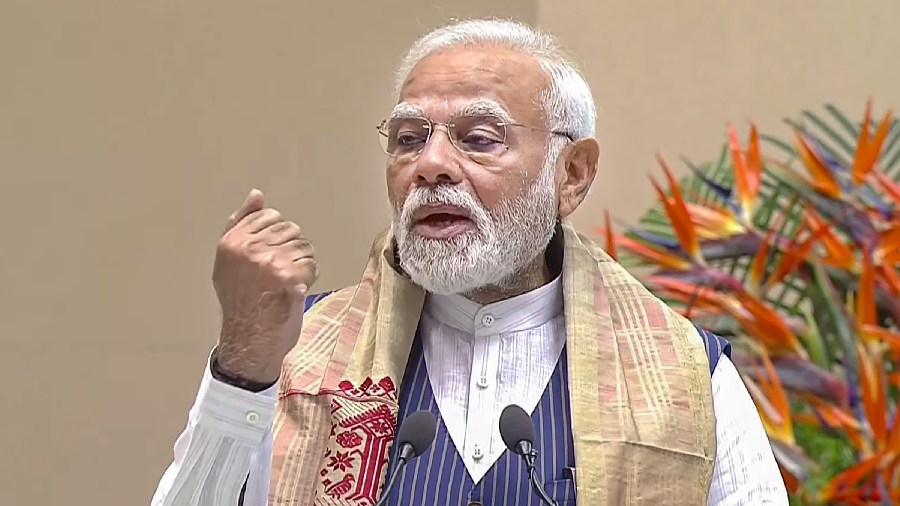The government has asked all central higher-education institutions, including the IITs and IIMs to organise events promoting India as the “Mother of Democracy”, an idea that an academic said glosses over the caste-hierarchical structure that has historically marked Indian society.
The theme of the Constitution Day celebrations on November 26 this year is “India: The Mother of Democracy” — a sobriquet that Prime Minister Narendra Modi had used while speaking at the UN General Assembly in September 2021.
Now the Indian Council of Historical Research (ICHR), which functions under the education ministry, has published a book, India: The Mother of Democracy, edited by its chairman Raghuvendra Tanwar and member-secretary Umesh A. Kadam.
Education minister Dharmendra Pradhan released the book on Thursday.
The book says India has nurtured democracy since the Vedic period through self-governing village communities insulated from the rule of the State.
Based on the book, the ICHR has prepared a concept note that higher education secretary Sanjay Murthy has circulated among all central higher education institutions, asking them to participate in an online quiz on “India: The Mother of Democracy” and organise seminars and webinars “befitting the occasion”.
A professor of political and international relations, Rajen Harshe, who is not connected to the book or the ICHR, questioned the theory saying that the Varna hierarchy went against the modern understanding of democracy as resting on equality.
“In India from Vedic times, two kinds of states, janapada and rajya, have been in existence,” the note says.
“The Indian experience evolved its own form of governance at the level of the village and the central polity: (i) the federal/ central political structures were delinked from the life of the community (village community), (ii) village communities became self-governing and autonomous, (iii) developed a hierarchy of self-governing institutions such as panchayats and Khaps that enabled them to remain unaffected by and large by the changing kingdoms/ empires, particularly those of the invaders hostile to Hindu culture.”
It adds: “This explains the survival of Hindu culture and civilisation in the face of 2,000 years of invasion by alien ethnicities and cultures. This became possible because the Hindu mind from the beginning addressed the central question of how to weld this vast multiplicity that is India into a single larger community and from ancient times, a geocultural definition has been given to this entity, rashtra Bharat.”
The note refers to the Rig Veda, which speaks of sabhas and samitis. These assemblies must have acted as a check on the power of the king, it says.
Harshe told The Telegraph: “If you are saying India is the mother of democracy, then define democracy and explain how it evolved. As we understand it, democracy rests on equality. Can any (caste) hierarchical system be called democratic?”
Pradhan said edicts found in Tamil Nadu’s Thanjavur referred to the panchayat system in the fourth century.
“We give sugar to an ant that bites us. If anyone comes to our house, they will not return on an empty stomach,” he said, describing these as “our democratic values”.
He said at the time Ashoka conquered it, Kalinga had no king.
“It was a collective leadership that was ruling,” he said.
“We are passing through a transition. Certain things will change but our democratic spirit will not change. We follow vasudhaiva kutumbakam (the whole world is kin). By birth, by DNA, we are democrats.”










